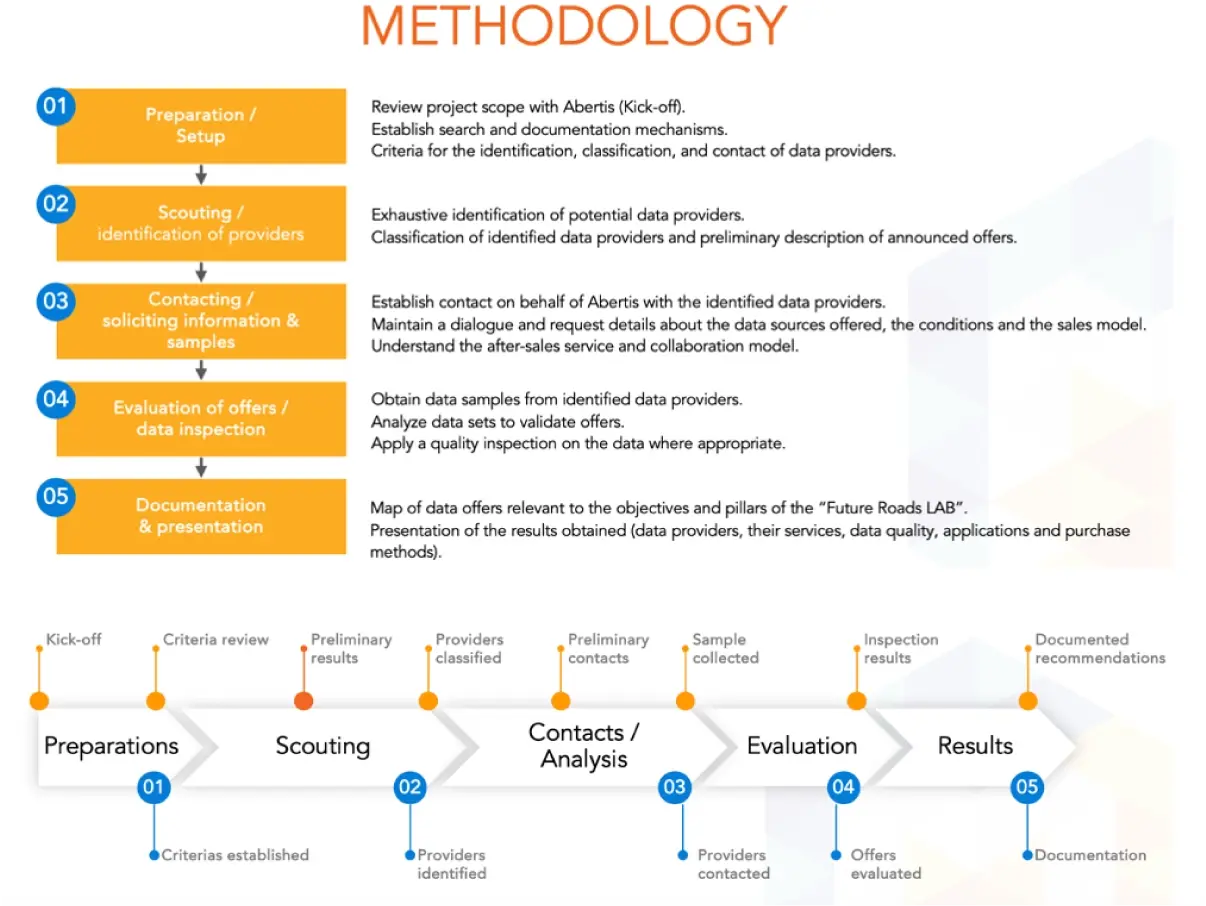Data Scouting
Client
Partners
The problem
The launch of the Future Roads Lab initiative by Abertis comes with a set of objectives aimed at advancing cooperative, connected, and automated mobility (CCAM) ecosystems.
-
- Gaining a deeper understanding of the role of road operators in CCAM ecosystems, and to consolidate this knowledge.
- Developing new and innovative CCAM services, which will require collaboration with key providers.
- Driving progress and growth in the CCAM space, ultimately leading to safer, more efficient and sustainable transportation systems, by partnering with these providers,
Therefore, our Data Scouting solution should:
-
- Identify providers: Through an exhaustive scouting focused on the mobility and transport sector, identify and profile the different data providers for the fields of action and lines of work defined under the framework of the Future Roads Lab. This review considers a wide range of potential data providers, and a variety of data types, such as traffic data, weather data and environmental data.
- Establish contact with suitable providers: Once potential data providers are identified, a more detailed analysis of each provider’s data offerings is conducted, and their capabilities to provide accurate and timely data is assessed. For this purpose, contact channels with active data providers and suppliers are established, and details and additional information about the data offered is requested, including the sales models and post-contract service.
- Evaluate data services: In order to select the most suitable data providers for the Future Roads Lab, technical and commercial information is compiled on the data services offered by the identified providers, including a high-level inspection of requested data samples. This information is then evaluated to determine the maturity, quality, and added value of the offers. Once this evaluation is complete, the offers are classified according to their relevance to the Future Roads Lab.
- Identify providers: Through an exhaustive scouting focused on the mobility and transport sector, identify and profile the different data providers for the fields of action and lines of work defined under the framework of the Future Roads Lab. This review considers a wide range of potential data providers, and a variety of data types, such as traffic data, weather data and environmental data.
To achieve these objectives, it is essential to identify a range of data providers that offer different types of data relevant to the Future Roads Lab’s needs, focusing on well-established providers with a proven track record of delivering reliable data.
This can include:
-
- traffic data,
- weather data,
- road network data,
- environmental data, among others.
Ultimately, the goal is to identify a list of 20-30 active data providers that are most relevant to the Future Roads Lab.
Finally, in collaboration with Abertis, the following reference use cases have been defined to help delimit more clearly the scope of this scouting exercise.
-
- (UC1) Advanced Traffic Management
- (UC2) Digital Road Safety
- (UC3) Road Infrastructure Optimization
- (UC4) Digital Operation and Maintenance
- (UC5) Sustainability of highways
The solution
A complete and very detailed data scouting to identify data providers relevant to the Future Roads Lab initiative of Abertis is the main outcome of this project.
The data scouting methodology is shown in the following figure:

-
- A report presented the findings of a scouting exercise that aimed to identify data providers relevant to the Future Roads Lab initiative of Abertis. The exercise involved extensive research to profile potential providers and evaluate their data samples across five general use cases.
- Once potential providers were identified and profiled, they were contacted and interviewed to verify their interest in providing services to Abertis and to refine the information collected on their offers. Providers were requested to share information about their offers and data samples, which were evaluated and inspected for an in-depth assessment.
- The scouting exercise identified:
- 50 data providers,
- 24 of them were deemed highly compatible with the application areas and use cases of the Future Roads Lab.
- These 24 providers were contacted and evaluated to understand how their offers could add value to Abertis.
The report also notes that the identified data providers were grouped into five categories based on the type of data they offer. The categories and their respective providers are documented in detail within the report.
Overall, the report serves as a comprehensive account of the scouting exercise, its methodology, and its findings. It provides insights into the process of identifying relevant data providers for Abertis’ Future Roads Lab initiative.
Results
The results of the project consist essentially in the final confidential report of the scouting provided to Abertis, with the providers data portfolio as well as data files and other useful information for the main objectives of the project.
The results include an assessment of the providers considering: data type (Floating car data (FCD), Connected vehicle data (CVD), mobile and telecom data (MTD), ESG and emissions data (ESG) and Road conditions data (RCD)), region, experience, added value, applicability, quality, reliability, conditions, privacy and sales model.
There are data inspection results as well, considering data source, aggregation level, data latency, data richness and data applicability, which results in an overall data quality score.
Finally, there are specific data provider cards such as this:


























